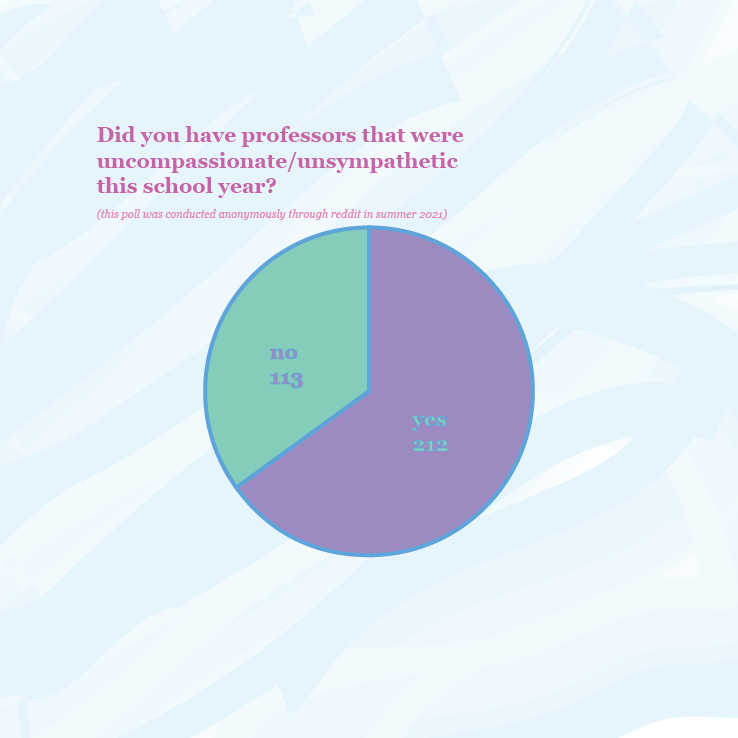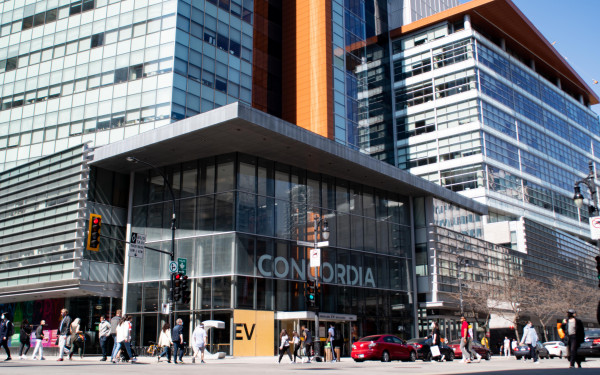Concordians look back on a year of uncompassionate professors
The 2020-2021 academic year brought challenges forth that had not been experienced before. Here’s how they reflected on Concordia professors. Graphic Mariana Chajon Oliveros
In an anonymous poll, over two-thirds of students voted that they had an uncompassionate professor during the 2020-2021 year
After more than a year of online learning, The Link posted a poll to Concordia’s Reddit server to ask whether students had an unsympathetic or uncompassionate professor during the 2020-2021 academic year. Out of 325 total votes, 212 students voted Yes—making up an overwhelming 65 per cent of votes.

The academic year wasn’t all bad. In the same post, students mentioned there were some great professors that deserved recognition for their outstanding teaching style and compassion throughout the year. But less than 35 per cent of students voted that they didn't have an uncompassionate professor during the pandemic school year—which meant that for every compassionate professor at Concordia, two other students were met with unsympathetic instructors.
Students spoke about some of the worst experiences they’ve had in their academic careers, and many spoke in anonymity for fear of retaliation from faculty.
One student, S.B., spoke about multiple experiences with uncompassionate professors throughout the year. S.B. was a student who had nearly completed a political science class until two deaths occurred in their family just weeks apart. S.B. emailed their professor to advise that completing the final would not be feasible as they were unable to eat or sleep. The professor replied that their option was to take a DISC notation, which does not impact S.B.'s gpa, but ultimately dismisses the work they had done up until the end of the semester.
In the same semester, S.B.'s computer broke down less than 24 hours before a midterm was due, and the professor replied that exceptions could not be made because it could be considered favouritism. Several other students also spoke about professors who expected computer issues would be resolved immediately, assuming that all students had hundreds of dollars at their disposal to fix them.
Another student, Gabrielle, recounted an experience with a computer science professor. One of Gabrielle’s teammates for a group project was living in India and had tested positive for COVID-19. They notified the professor right away, three weeks before the project due date. Three weeks later, the group handed in their project in time, with their sick classmate’s name on it, but the professor had never replied.
“I just couldn’t believe it,” Gabrielle said. “[My classmate] almost died, and this professor isn't even giving her the time of day to answer or be compassionate.”
“I just couldn’t believe it,” Gabrielle said. “[My classmate] almost died, and this professor isn’t even giving her the time of day to answer or be compassionate.” — Gabrielle
An anonymous student spoke of an Italian language professor who verbally abused her students in Zoom classes, berating them for making mistakes as they practiced Italian. Towards the end of the semester, only three students would show up to class. The professor would change the dates of assignments and exams and only announced those changes during class times—even though attendance was not mandatory.
“The amount of breakdowns I’ve had this year... It was a lot,” the student said. “I’m really glad I was able to finish, but I just don’t think it should be this hard.”
During the online year, there were professors who exercised compassion and flexibility. Many students said empathy and compassion from professors were a major influence in their mental health and academic well-being during the online year.
“There are so many ways to accommodate students at this time—and many professors are already doing it. Yet many other professors are just refusing to accommodate,” said Eduardo Malorni who was the Concordia Student Union Student Life coordinator for the 2020-2021 academic year.
Malorni said the CSU has received numerous complaints about uncompassionate professors during the online year. Complaints ranged from professors ‘ghosting’ students and never replying to emails, to being inflexible with their exams and class times for international students in conflicting time zones.
“We’ve been having the same conversations with the administration for literally the entire year,” Malorni said.
Students emphasized that compassionate professors made a lasting difference to their academic year. S.B. spoke about Dr. Daniel Douek, part-time professor of the political science department, who started his first class by letting students know that “he understood they were going through a lot.”
“[Professor Douek] said that we needed to prioritize [our well-being] and never hesitate to ask if we needed anything,” S.B. said. “I almost started crying. Because I needed to hear that so many times this year.”
Another student, Ghayour Moriya, emphasized the impact Professor André Chamoun of John Molson School Business had on his learning during the online year. Moriya said Chamoun took great care to make himself available to students and was engaging in his lectures.
Chamoun was also known to be generous with students who asked for extensions or accommodations. Every semester, students would ask for an extension in each class he taught, citing an extenuating circumstance. Whether those circumstances were verified was not a concern to Chamoun.
“If out of the six students who ask me for accommodations, only one of them actually needs it, it would be worth it for me to do everything I can to make sure that one student gets the help they need,” Chamoun insisted. “I’m here to help all students, that’s what’s important to me.”
Dr. Ian Rakita, president of Concordia University’s Faculty Association, said the online year required a lot of adjustment from professors, which students should take into consideration. When confronted with stories about students who suffered from mental health impacts, Rakita urged students to obtain medical notes in order to be officially excused from academic obligations.
However, students have noted that under extreme duress—particularly during a global pandemic with an unspeakable amount of loss—it can be draining to fight for basic decency from professors.
...students have noted that under extreme duress—particularly during a global pandemic with an unspeakable amount of loss—it can be draining to fight for basic decency from professors. — Diane Yeung
“I think [empathy]—well it shouldn’t be a given—but it should be a requirement,” said Rakita when he was asked whether professors should be empathetic. He also said he hopes Concordia students and professors can move on from the pandemic school year and that the challenges of online learning will soon be behind us.
However, some students say that the effects of the online year have been deep and potentially lasting.
“Shell shock and Post-Traumatic Stress Disorder (PTSD)—you don’t have to witness something cataclysmic all at once,” said student Corey Shallow. “You can endure something over a long period of time and get PTSD.”
What’s clear from the Concordia students who have spoken with The Link is that the university can do more to improve the academic lives of students, whether in person or online.
“Professors need some sort of Human Resource or sensitivity training,” said Gabrielle. “Because I’m really tired of not being treated like a human being.”


1_600_375_90_s_c1.jpg)

